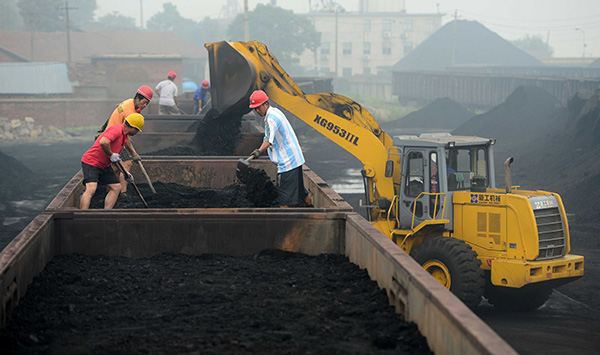Longmay to cut 100,000 coal jobs
By Lyu Chang (China Daily) Updated: 2015-09-26 09:37
|
 |
|
Faced with falling prices and weak demand in a slowing economy, coal companies will find it an opportune time for mergers and acquisitions, industry experts said on Tuesday. [Photo/China Daily] |
Non-core businesses being sold to pay off debts as mining group reels from continued losses
The largest coal mining group in Northeast China is cutting 100,000 jobs within the next three months to reduce its losses - one of the biggest mass layoffs in recent years.
Heilongjiang Longmay Mining Holding Group Co Ltd, which has a 240,000 workforce, said a special center would be created to help those losing their jobs to either relocate or start their own businesses.
Chaiman of the group Wang Zhikui said the job losses were a way of helping the company "stop bleeding".
It also plans to sell its non-coal related businesses to help pay off its debts, said Wang.
The State-owned mining group has subsidiaries in Jixi, Hegang, Shuangyashan and Qitaihe in Heilongjiang province, which account for about half the region's coal production.
China's coal mining industry has been struggling with overcapacity and falling coal prices since 2012.
Last year, Longmay launched a management restructuring and cut thousands of jobs to stay profitable, amid the overall industry decline.
However, the company still reported around 5 billion yuan ($815 million) in losses.
It has been a dramatic fall from grace for the company, which in 2011 reported 800 million yuan in profit with annual production exceeding 50 million metric tons.
Experts said staff costs remain a major reason for the company's continued heavy losses.
Last year its coal production stood at 49 million tons, just 10 percent that of Shenhua Group Corp Ltd, China's biggest coal producer. But Longmay's workforce remains well above that of Shenhua's 214,000 in total.
Official data show that average annual production per head at Longmay is about 250 tons, against a national industry average of between 500 to 600 tons.
Longmay also has 180,000 pensioners to take care of, with life-long payments covering pensions and medical insurance, which are also considered a huge financial burden.
"Personnel is probably its largest cost," said Deng Shun, an analyst at Shanghai-based energy consultancy ICIS C1 Energy.
"Actually many traditional State-owned coal enterprises are facing the same kind of problem. It has become more severe as the industry remains on a downward trend."
Deng also cautioned on the social problems that massive layoffs may cause, suggesting a reduction in welfare or salaries might be a better way to cut back on costs.
- China to create national carbon-trading market
- Central bank vows continuity, stability in monetary policy
- E-commerce site Jumore to boost bulk trading of commodities
- Chinese firms in race to buy Dublin-based AWAS Aviation Capital
- CSRC to root out trading on illegal stock accounts
- Brewer Molson Coors plans China exit
- Longmay to cut 100,000 coal jobs
- WeChat, DiDi Taxi among infected apps on Apple store
















